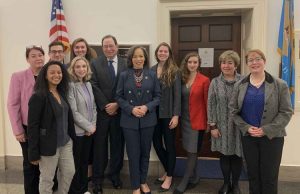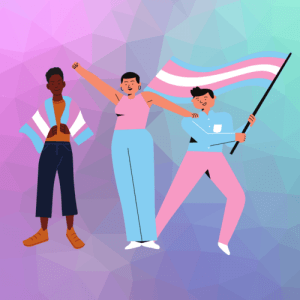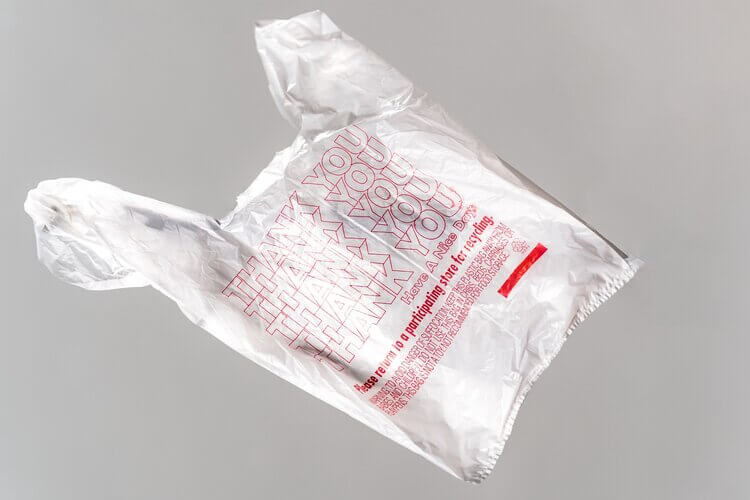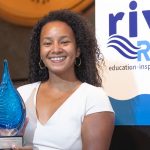Sandra Meola
Sandra Meola joined the Coalition for the Delaware River Watershed (CDRW) in 2018, serving as Director. Sandra’s role includes directing advocacy strategy to advance federal and state policy priorities, building and facilitating relationships among a diverse group of stakeholders and decision-makers, and connecting the dots for effective partnerships. Prior to her role with the Coalition, Sandra served as NY/NJ Baykeeper’s Policy and Communications Director where she founded and managed a plastic pollution campaign consisting of research, education, and advocacy. She received an Environmental Champion Award from the US Environmental Protection Agency in 2016 for this work. Sandra earned a Bachelor’s degree in Political Science and History and a Master’s degree in Public Policy from Monmouth University. Sandra was part of Lead NJ’s 2017 graduating class and a member of the 2019-2020 NJ Conservation Leadership Program cohort.
This interview was conducted by Carly Schmidt on November 24, 2020. To learn more about Sandra and her work, visit delriverwatershed.org.
Tell me about your role at the Coalition for the Delaware River Watershed?
I’ve been the director at the Coalition for the Delaware River Watershed for about two and a half years. It feels like I’ve been here longer, just because of how this year has played out and how busy we’ve all been. Essentially, the Coalition is a network of more than 150 nongovernmental and nonpartisan NGOs. Members range from small groups on the front lines of watershed protection to regional and national groups like the National Wildlife Federation, National Parks Conservation Association, etc. We work toward getting everyone under the same tent with big ideas toward a restored and protected Delaware River Watershed.

The Coalition and partners with Representative Lisa Blunt Rochester in Washington, D.C. for the Coalition’s annual Delaware River Watershed Hill Day (March 10, 2020).
In an election year, it’s difficult to reflect when so many of us are wanting to look forward. Looking back on 2020, what moments or accomplishments come to mind that you are particularly proud of?
Every year, we organize a Hill Day down in D.C. where we bring our members and constituents with us to advocate for federal dollars for our priority programs. We were there on March 10, which was also the day that the governor of New Jersey issued a state of emergency. We ended up moving forward with the event and were still able to meet with the entire watershed delegation, which transpired into some successful outcomes. For example, the Great American Outdoors Act passed a couple of months ago, which provides full, permanent funding for the Land and Water Conservation Fund and addresses some backlogged park maintenance issues. That was really significant. The other significant win has been having our advocacy come to fruition for the Delaware River Basin Restoration Program. The Coalition’s collective ask for the Program was $10 million. The US Senate has yet to confirm their appropriation bills, but we’re hoping that will happen soon. And, of course, working on our diversity, equity, inclusion, and justice efforts in this time when it’s more important than ever to stay connected on these efforts.
You also hosted the Delaware River Watershed Forum virtually! What was that like?
The Watershed Forum was a huge shift from how we normally do things! We made the call to go virtual relatively early, back in April. We just had to read the writing on the wall and decide that we couldn’t have 350 people in the same room in Philadelphia, so we adapted quickly, using some lessons learned from River Network’s River Rally.
We’ve used the same kind of virtual adaptation with a lot of other meetings, too! We usually go down to D.C. to meet with legislators and their staff at least quarterly. These are now phone calls or over Zoom, but we find that those work really well. It was typically difficult to get people together in person because schedules are so crazy. Then, they only have so many minutes. With Zoom calls, we’ve been able to grow relationships even deeper and spend the time to dig into the issues. It’s been working out pretty well!

Read “Building a Trans-Inclusive Workplace” by Olivia Le Warn, Engagement Coordinator, Coalition for the Delaware River Watershed.
How are you thinking about your impact differently in 2020?
I think, at the beginning of the pandemic, we were brainstorming and trying to figure out how to stay relevant and support our member organizations on a virtual platform if we’re not promoting in-person events. In the year ahead, we decided that we need to provide best practices for an organization in a virtual space, like how to approach equity work in this really strange time or retain staff. Especially if some organizations are implementing raise or hiring freezes, how do you create a job pipeline for youth? I’m particularly interested in creating opportunities for young people to intern and start careers in this field. I do believe that our advocacy impact will remain the same so long as we are able to be effective. Hopefully, we can transition back to in-person meetings with congressional staffers in 2021.
How did your work as a coalition change in 2020?
The Coalition has not participated in civic engagement or education, historically, but we did this year. We partnered with our sister coalition, the Choose Clean Water Coalition, which represents the Chesapeake Bay Watershed, and we’ve created a Civic Engagement Toolkit with them. The Toolkit includes deadlines for voter registration, how and where to vote at secure drop box locations, and how to combat voter suppression. We encouraged members of both coalitions to share the Toolkit with their followers, donors, and members. I anticipate that we will continue that work because it’s important for us to amplify the collective power of the watershed and defend against threats to democracy.
You, personally, have such an impressive track record! How did you come into this work?
I was born in the City of Paterson in urban northern New Jersey. My grandparents owned a small motel in Cape May County, and we spent the summers at the bay. That’s where environmental protection work resonated with me. When I would go back home to Passaic County, one thing that really stuck out was the odor near the river, particularly after a rain event. The combined sewer overflow pipes were discharging raw, untreated sewage into the Passaic River, making it unsafe for certain recreational uses. I saw the stark comparison between my two childhood hometowns and was moved to help.
One of my first jobs out of college was for a small nonprofit focused on water quality. I was teaching a group of third graders, and a little boy asked me: why aren’t people swimming in the Passaic River? I had to explain the concept of combined sewer overflows and the associated health risks. For me, it’s always been about making sure that everyone has access and shares equitably in clean water, and that has translated throughout my career so far. The nonprofit world is such a wonderful place to be because you can really see your day-to-day work come to fruition. My journey has taken me to some of the coolest jobs and experiences in the last nine years or so, and it’s been great.
Has there been a particular moment in your career where you’ve really seen the fruits of your labor? What was that like?
Right before I joined the Coalition, I was working for the NY/NJ Baykeeper, a Waterkeeper Alliance member. One of the initiatives where I really saw my work come to fruition was my work on plastics. My boss at the time gave me a lot of flexibility. She encouraged me to fill a gap that the organization wasn’t working on. I started a research study to quantify and classify the types of plastics that were floating within the NY-NJ Harbor. The study resulted in a published peer-reviewed journal article and an article in the New York Times. Additionally, working at the Coalition, it’s amazing to visit a site and see what the federal dollars that we’ve advocated for will do.

Read about Sandra’s 2016 work on plastics in the New York Times and about New Jersey’s recent victory in introducing the strongest, most comprehensive single-use plastics bill in the nation.
Tell me about your work on plastic and how you came to identifying and addressing the problem on your own.
This started back in 2014. I got a call from the 5 Gyres Institute in California alerting me to a bill moving through the NJ legislature that would ban plastic microbeads from personal care products. I did some research and learned that plastic microbeads were in our face scrubs and toothpaste and body scrubs. I advocated for the legislation alongside colleagues and then applied for and received a US EPA Urban Waters grant to begin researching. I constructed a team that would partner closely with Rutgers University and the City of Newark. Plastic pollution was something that we addressed through community clean-ups, but they weren’t a long-term solution to the problem. We needed to stop plastic pollution at its source by advocating for bans and fees on single-use products. It was such a rewarding time in my career that I always smile when I talk about it.
It is great that you were empowered to take on this project! Did you have a mentor at this time who encouraged you?
My mentor was my manager when I was at NY/NJ Baykeeper, Debbie Mans (now deputy commissioner of the New Jersey Department of Environmental Protection). She was encouraging and supportive of the new campaign for the organization. When the work on plastics started, it became a significant campaign for the organization and was unique in the region at the time. So much trust and creativity were fostered by her allowing me to run with something.
How are you looking ahead and planning for next year?
Today (October 26, 2020), we sent an email to our coalition members launching our annual priority process. Every year, we ask for member nominations for issues that we should work on as a collective network. We spent a lot of time earlier in the summer revamping the process to make it more engaging, transparent, and inclusive. I’m really excited to embark on that work and continue to tweak and improve it as we go. We’ve also spent a lot of time strategic planning over the summer. We were able to hone in on how we want the coalition to function in the years ahead and fine-tune our vision.







